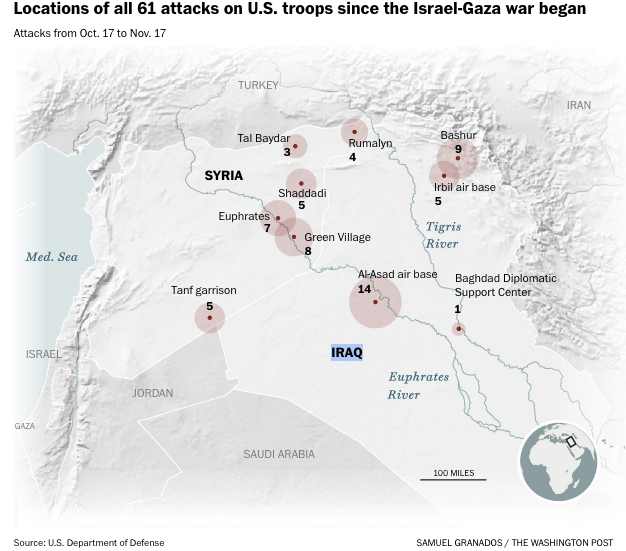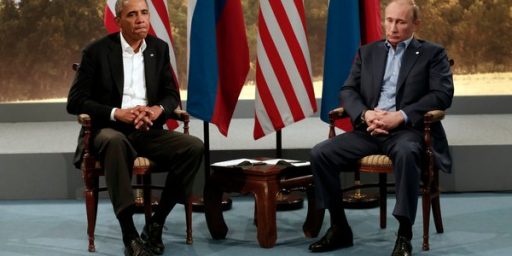Iranian Proxy War Escalating
Tehran-backed forces are routinely shooting at American forces.

WaPo (“A split emerges as Biden struggles to deter attacks on U.S. troops“):
A surge in attacks on deployed U.S. forces has roiled some within the Defense Department, where officials, frustrated by what they consider an incoherent strategy for countering the Iranian proxies believed responsible, acknowledge the limited retaliatory airstrikes approved by President Biden have failed to stop the violence.
“There’s no clear definition of what we are trying to deter,” said one defense official, who like others spoke on the condition of anonymity to be candid. “Are we trying to deter future Iranian attacks like this? Well, that’s clearly not working.”
While I understand the granting of anonymity for purposes of candor, the lack of consistency in the use of terms like “defense official” is frustrating. Is this a senior Biden appointee? A senior military officer in Washington? A commander in the field? Some random captain? I have no idea.
And, frankly, “some” folks in an agency that employs over 2 million people full time (and another ~800,000 reservists) can be found to complain about anything.
Those caveats in place, the situation is indeed fraught. We have US forces on the ground in a war zone with very little transparency to the American public.
Seething anger in the Middle East over U.S. support for the Israeli military campaign in Gaza, where thousands of Palestinian civilians have been killed in the past six weeks, has heightened concern among Biden and his deputies that any overreaction to the attacks on U.S. personnel could incite a wider conflict. In conjunction with the airstrikes, administration officials have urged Tehran repeatedly over the past month to rein in the militia groups it supports, cautioning that the United States has “the right” to respond “at a time and place of our choosing.” But those warnings have gone unheeded.
That’s not surprising. We’re been actively supporting the Saudis in their proxy war with Iran for years, although perhaps not as actively under Biden. And Iran has paid very little price for supporting proxies across the region, including against US forces in Iraq, over the last two decades across multiple administrations.
Alas, because Ukraine and now Israel have gotten so much attention, the situation has gone very much under the radar. Indeed, even though I follow this sort of thing way more than even most heavy news consumers, I wasn’t fully aware of the scale here:

Since Oct. 17, U.S. troops in Iraq and Syria have faced near-daily assaults from rocket fire and one-way drones, recording at least 61 incidents and about as many injuries in that span. Pentagon data obtained by The Washington Post shows that the attacks have targeted 10 bases used by American personnel who are spread across both countries.
In response, Biden has authorized three rounds of airstrikes, all in eastern Syria. The most recent, on Nov. 12, targeted sites the Pentagon identified as used by Iran’s Islamic Revolutionary Guard Corps and “Iran-affiliated groups.” A U.S. official said that as many as seven militants were killed, a “rough estimate” as the United States continues to assess the results.
The strikes have destroyed purported warehouses holding weapons and ammunition, a command post and a training facility, officials have said. Yet each operation has failed to slow the drumbeat of hostile activity, which in all cases resumed almost immediately. The 61 attacks on U.S. troops have come at a startling frequency as well: There were about 80 similar incidents between January 2021 and March of this year, the Pentagon has said.
It would seem that the Biden administration has simply treated these as a cost of having so many forces stationed around the region.
A senior defense official said the Pentagon has provided additional options to the president beyond the actions that have been taken to date. This person affirmed, too, that within the Defense Department there is growing doubt about the present approach.
In a statement, National Security Council spokesperson Adrienne Watson said that Biden has demonstrated that “he will never hesitate to take action to protect U.S. forces” and that the president is “fully prepared to take further measures as needed at any given moment to protect our people.”
Iran has long provided support to militias seeking to dislodge the American presence in Iraq and Syria, where approximately 3,500 troops are deployed to prevent a resurgence of the Islamic State terrorist group. Tehran also backs Hezbollah in Lebanon, whose leaders have threatened to open a new front against Israel, and the Houthi rebels in Yemen. The Pentagon said that Houthis destroyed a $30 million U.S. Reaper drone over the Red Sea in recent days, and U.S. warships have in the past few weeks intercepted weapons fired from Yemen in the direction of Israel.
Christine Abizaid, director of the National Counterterrorism Center, told House lawmakers on Wednesday that, despite the unabated attacks on American personnel, Iran and its proxies are “trying to walk a very fine line in the region.” There appears to be a concerted effort, she said, to avoid “overt actions that risk opening them up to a more direct conflict with Israel or the United States while still exacting costs by enabling anti-U.S. and anti-Israel attacks.”
And a concomitant strategy by the US administration to avoid escalation. Some token strikes on the facilities of Iranian proxies are hardly going to dissuade Iran. But, rather obviously, the Biden team has judged the risks of escalation that would follow direct strikes on Iranian targets too high.
Probably for good reason.
In their public statements, Defense Department officials have sought to downplay the attacks in Iraq and Syria, describing them as often inaccurate and causing little damage to U.S. infrastructure. The troops who have been hurt all have returned to duty, they’ve said, classifying the reported brain injuries and other collateral as “minor.” The United States has also added more air defense systems into the region, which have shot down several of the drones, according to the Pentagon data.
There’s a harshness to this judgment. Traumatic brain injuries can be life-altering. To some degree, though, these are risks that American volunteer military personnel sign up for.
At the same time, it’s hardly unreasonable to ask whether the missions being accomplished by having 3500 of them stationed in a hazardous duty zone is worth that risk. Given that nobody actually seems to be asking that question, let alone anyone from the administration explaining it to the American public—who are mostly completely oblivious that this is even happening—it’s nearly impossible to know.
But as the attack count has continued to climb, so too has the concern that it is only a matter of time before one claims a U.S. service member’s life.
“I don’t sense any deterrence,” Sen. Kevin Cramer (R-N.D.), a member of the Senate Armed Services Committee, said in an interview. “They keep shooting, waiting for us to respond. We don’t, so they keep shooting. And eventually one of those drones, or one of those missiles or rockets, is going to kill an American. And then we’ll be off to the races.”
“I’m not suggesting we start a full-fledged war with Tehran,” he added. “But I do think our posture has to be a little more aggressive than just strictly defensive, because one of these days, we’re going to miss one of those drones.”
There’s a reason Presidents and their senior appointees make these judgments and not Senators from North Dakota. One presumes that Central Command and the Defense Department have contingency plans ready for what happens if the severity or success of these attacks increases. But, again, it would be nice to have a more open dialogue about the situation rather than it being almost completely off the radar.
The senior U.S. defense official acknowledged that the Pentagon sees few good alternatives to the measures taken thus far, which, in addition to the limited retaliatory airstrikes and buildup of air defense weapons, include the deployment of two aircraft carriers near Israel and Iran. Carrying out strikes in Iraq, for instance, has the potential to exacerbate anti-American sentiment there, where U.S. troops are deployed at the invitation of the government in Baghdad. Direct strikes on Iran would amount to a massive escalation.
The Pentagon continues to refine response options, a U.S. official said.
At a news conference Tuesday, Defense Department spokeswoman Sabrina Singh rejected the suggestion that these sustained attacks on American forces revealed shortcomings in the administration’s deterrence strategy. That the war in Gaza has not spread, she said, is evidence the approach is working.
The three retaliatory operations taken to date, Singh said, are intended “to signal and to message very strongly to Iran, and their affiliated groups, to stop.” When a reporter challenged the assertion, noting that the militia fighters “keep striking” U.S. troops, Singh said the military response has been “very deliberate” and that Iran “is certainly seeing that message.”
Joseph Votel, a retired Army general who as the head of U.S. Central Command oversaw all military operations in the Middle East from 2016 to 2019, said it may be too early to tell if the administration’s strategy can or will stifle the attacks on U.S. troops.
“When you do things to try to change people’s behavior, it takes time for that to set in,” said Votel, now a senior fellow at the Middle East Institute, a think tank. “Now we have to think about the volume and the responsiveness, and how that has an effect over time.”
Whether it’s happening fast enough, he said, is “subject to interpretation.”
Again, I presume responsible parties in the administration and professionals in DOD are in fact thinking about all of this. It’s clear that there are no great options for responding without risking major escalation.
At a minimum, there ought to be hearings on the matter. In the current political atmosphere, I fear even more grandstanding than usual by Members. But HASC and SASC should certainly be conducting oversight of this.






We need assessment on whether the presence of those troops is really stopping the re-emergence of IS. If they arent then we pull out, however if another group arose or something bad happened then Biden would be blamed. It’s just a truism that anyone who leaves an areas we occupy, even if the occupation is going poorly and not accomplishing anything, gets blamed for anything bad that happens after. However, if we think there is value in being there we need the support of the IRAQ govt to remain there. If the Iran proxies are working in the middle of non-combatants, as is likely, any serious retaliation risks killing civilians and having Iraq booting us. It’s kind fo a no win.
Steve
Is it? Is the intensity of the attacks on US bases ramping up?
So far, we have seen pinpricks back and forth. But nothing yet that resembles a full-blown escalation.
Hezbollah is keeping pretty much quiet. Iran-backed militias in Iraq and Syria are doing far, far less than they could be doing.
Deterrence does not necessarily mean no violence whatsoever.
What I see are levels of violence that appear to signal that direct involvement in the Gaza crisis by either the US or Iran/Hezbollah will come at a price. In other words, levels of violence that are specifically meant to deter rather than to have a direct impact on the other side’s military capabilities.
It’s just that Cramer doesn’t like that other countries (or perhaps non-peer adversaries) can play the deterrence game, too.
Comment deleted for excess stupidity.
@steve: My decidedly non-expert take is that Iran would love for us to withdraw forces, as it provides them with more scope for their own military operations. I also think that Iraq would want to keep us there for exactly this reason. A similar reasoning applies to the Kurds, whom I expect see us as a buffer against the Turks as well.
I would be very surprised if a few casualties changed either equation.
“When you do things to try to change people’s behavior, it takes time for that to set in,” said Votel, now a senior fellow at the Middle East Institute, a think tank. “Now we have to think about the volume and the responsiveness, and how that has an effect over time.”
Seriously? Isn’t this “hearts and minds” all over again? Why oh why don’t foreigners understand that we know what’s best for them? The ingratitude of them. Pretty soon it will be necessary to destroy the village in order to save it.
@Not the IT Dept.:
No.
Votel is just saying that it takes time for the decision makers in Tehran to digest the US response and to (potentially) adjust their own actions to it.
Mutual deterrence is a tricky thing. On the one hand, you can’t de-escalate too much in response to your opponents demonstration of resolve because that could be interpreted as a lack of resolve on your part. On the other hand, you can’t counter too much, because that could lead to uncontrollable escalation.
So you have to get things just right. Getting there might take a couple of days or even weeks – both in Washington and Tehran.
Welp, in my book, we did an absolutely awful job of counterinsurgency in Vietnam. Pretty much doing the opposite of what would have helped with “hearts and minds” which are, in fact, important. If the claim is (I’m not sure it is) that trying to win the support of local populations is bad, because Vietnam worked out badly, that’s taking the exact wrong lesson from Vietnam.
In a lot of N. Iraq, we have done very well. The Kurds are solid with us. I don’t know how the rest of Iraq feels, but I’m sure they hate Iran more than they hate us.
Just to add some context here, the DoD now has a Traumatic Brain Injury (TBI) protocol for anyone who is near events that can cause them like explosions. This is, very roughly, analogous to the concussion protocol in the NFL – it’s a precautionary measure to determine if TBI has actually occurred, and usually it hasn’t, which is why these “injuries” are typically resolved quickly with personnel returning to duty.
Yes, it’s something that is way under-discussed, especially since the US actually has no legal authority to have a military presence in Syria. These bases were originally part of the effort to defeat ISIS, but now, at least from my perspective, a lot of it is about attempting to maintain stability and fears that withdrawal will allow bad groups to move in (Iranian militias) and possibly a resurgence of ISIS or something like it.
Added to this is the fact that Syria still has the biggest refugee crisis globally, with almost 7 million IDP’s and another ~5.5 million who’ve fled the country.
@JKB: It’s very rare for you to realize that one of your comments was this bad. Congratulations!
@just nutha: I was pondering just how stupid a comment had to be for Dr. Joyner to just say “Nope. Not today, motherfucker.” 😛
Again, I presume responsible parties in the administration and professionals in DOD are in fact thinking about all of this
I hate to be this insulting but there’s no other way to put it. That anyone, let alone a man who blogs about politics and policy, would write such a sentence after the Afghanistan withdrawal debacle, the mess of the U.S./Mexico border, and the refusal to do anything but try and wish away the problem of inflation is a striking indictment of your decline in intellectual depth and rigor.
@TheRyGuy:
Don’t forget about woke corporations and librarians converting our children into trans Satanists also too.
@steve:
It’s not just preventing IS from popping back up.
It’s also about preventing the Syrian/Iranian/Russian alliance, probably with Turkish passive connivance, or at least indifference, from mounting an offensive against the SDF.
The backbone of the SDF effective forces being the Kurds.
@TheRyGuy:
“Wishing away” inflation seems to be working well enough, then, seeing as the US inflation rate is now at 3.2%
Compare with UK 5.6%, Germany 3.8%, France 4.5% etc.
Has the US paid a significant price for supporting proxies in the region? Did we pay a price for supporting right wing death squads in Latin America?
Blow up Iran or don’t*, but don’t pretend that they are doing something that we haven’t been doing for decades, or that they are doing something especially nefarious.
*: I’m in the “don’t” camp. Our last few wars in the region haven’t been particularly successful, even if we killed way more of them then they killed of us.
@Gustopher:
Generally speaking, the US has not been supporting anti-Iranian insurgencies across the region.
Generally the fishing in troubled waters has been an Iranian policy, aiming at “widening the arena” and keeping various pots simmering. The US and Iran are not at par in this regard.
@Jax: Wait??? … You mean Dr. Joyner struck that comment and JBK doesn’t realize anything? My hopes have been dashed yet again. 🙁
If the business leaders [Chamber of Commerce.. one of the bipartisan groups that sets most US policies] actually have a sudden interest in stopping immigration, they can and will fix this with one policy change.
When ICE raids a business, set the penalty for each undocumented immigrant that’s found at $100,000 – payable by the business.
Businesses in the US are at present quite large beneficiaries of immigrant labor….. because those immigrants are a powerless group that businesses exploit by paying below minimum wage. Restaurants, meat-packing plants and more employ illegal immigrants at $2/day.. because they can. Until the ROI on illegal immigrants is negative, nothing changes.
Good stuff, American History: Extra Chromosome.
Thanks for taking a break from ranking Doritos flavors to compose that paragraph of nonsense.
@TheRyGuy: Conservatives have zero solutions to these or any problems.
The Republican “solution” to Afghanistan was endless war.
The Republican “solution” to the border was a dumb, useless wall and pretending powerless migrants are bigger threat the than greedy, corrupt billionaire class — didn’t even bring an immigration bill to the floor when they controlled the White House, Senate and House. Oops.
The Republican “solution” to inflation is….*crickets*. Tax cuts for billionaires? Enslaving women with forced birth? Blocking sensible gun control? Selling out our allies to Putin’s warmongering genocide? Book banning? Attacking Bud Light and Disney? Smearing gays as groomers while protecting pedophiles and perverts like Donald Trump, Gym Jordan, and Matt Gaetz? Or whatever else Ron DeFascist is doing in Florida that has Florida inflation at 3x the national average? Yikes!
The right doesn’t have a clue how to fix the issues facing America today. Conservatives have no positive or constructive vision for our nation. All Republicans do is complain about Biden, fearmonger, undermine progress, spread hate, stole divisive culture wars, and blindly defend Trump’s criminality and corruption. (And try to steal credit for Biden’s infrastructure projects and record job growth.)
Which is why despite the Democratic Party’s myriad issues, Republicans keep losing elections.
@JohnSF: I know the Shah was a while ago, but we’re still living in the reality that created.
I’m not sure what anti-American insurgencies the Iranians support. There are some anti-Saudi things, and they were very excited to filter fake information to encourage us to go after Iraq. And they sure don’t like Israel.
They are opposed to our proxies, sure. But they don’t represent any kind of existential threat to us.
@TheRyGuy:..the Afghanistan withdrawal debacle,..
Was this the withdrawal from Afghanistan that Donald Trump negotiated directly with the Taliban, excluding the Afghan government?
FactCheck.org
@Gustopher:
True; but they do represent a potential existential threat to other states in the region, and to a key parts of the international order: the flow of oil and gas from the Gulf, and the recycling of the payments into dollars and into the Western banking system for reinvestment.
These are not issues that a Power can walk away from.
Obama, Trump and Biden have all, in their different ways, attempted to ignore aspects of the ME in the hope the problems will fade away.
They have not.
To mangle Trotsky: You may not be interested in the Middle East; but the Middle East is interested in you.